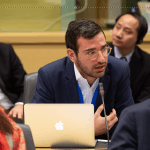The High-Level Political Forum - A Fancy Show Or A Reality Check?

Between the 8th and the 16th of July 2019, I had the opportunity, in my capacity as President of the European Students’ Union, and with the full support of the Global Campaign for Education, to participate in the High Level Political Forum that took place at the United Nations Headquarters in New York. Let me start off by saying that this was the first time I participated in such a forum, and I had a lot of mixed feelings and expectations before arriving to New York.
Six Sustainable Development Goals (SDGs) were discussed during the forum: equitable quality education (4); inclusive and sustainable economic growth and decent work for all (8); inequalities (10); combating climate change (13); promoting peaceful and inclusive societies for sustainable development (16); and strengthening the means of implementation (17). Also, under discussion were updates on progress and challenges and whether efforts are on track towards realizing the 2030 Agenda.
Still not on track to achieve the SDGs
Together with the remainder of the organising partners, we brought together the Education & Academia Stakeholder Group (EASG) that sought to bring forward the education agenda, and voice its concerns about the situation of privatisation and commercialisation of education and other risks that currently face the education sector. It was quite disappointing to see that when it came to the review of SDG4, most interventions dealt with how far off we are towards realising this goal, and very little emphasis was put on how to actually make quality education for all a reality.
This was also the case for most of the other reviews- with scenarios varying from very optimistic (and I dare say unrealistic) reviews from certain countries, and other very pessimistic ones from some others. The middle way, which realises reality and proposes concrete way forward was very scarce to find.
The importance of side events
Alongside all the official events, there were also plenty of side-events taking place, in which I felt that discussions were more honest and complete. The EASG organised one such session, with the title of “Education & Lifelong learning at the gateway of the global agenda”, which saw very productive discussions about the role of data in education, the myths that surround our lack of progress in SDG4 and the progress as perceived by teachers, as one very important stakeholder in the realisation of this Goal. Another very interesting side event was organised by UNESCO which featured a panel discussion on “Relevant, equitable and inclusive quality education for all: an imperative for the 21st century”. This high-level debate featured very honest discussions about the role of education, skills training, lifelong learning and research as key drivers for sustainable development. The interlinkage amongst SDGs, and the central role of SDG4 were also reaffirmed and highlighted. Concrete recommendations were also put forward in regard manners of dealing with the slow progress (or lack of) in SDG4.
A crucial role for civil society
Summing up my experience in the HLPF, I would say that we, as CSOs, have a crucial role to play in bringing these discussions to the grassroots, and vice-versa in bringing the grassroots discussions back to the HLPF. I realise now more than ever what a strong voice is needed by CSOs in order to keep the country representative grounded and honest in their reports. The interventions of CSOs and Stakeholders, might have been limited in their time, but I am sure that they were the ones with the strongest messages and truthful declarations.
I have to admit that I had moments where I was doubting how worthwhile the whole process was (particularly the bureaucracy which exists), but especially now that I’ve had time to reflect upon what went down, I understand how crucial these discussions have been. These forums are not crucial for countries to be too optimistic or pessimistic or to show off or be frowned upon. They are however crucial to bring people from all over the globe together (who represent the biggest groups of individuals and the smallest minorities), to support each other, and to make sure that our collective dream for a better future comes true, amidst all obstacles that we find on the way.

Robert Napier is the President of the European Students’ Union (2019-2020). Previously, he was appointed Vice President for the period 2018-2019. He holds a Bachelor of Laws (Hons.) and a Master of Advocacy from the University of Malta. Robert has a passion for Human Rights and is very keen on ensuring the understanding and implementation of the Social Dimension within the Higher Education area. The 2030 agenda also lies within Robert’s portfolio, alongside his work on the Bologna Process and the European Education Area.


